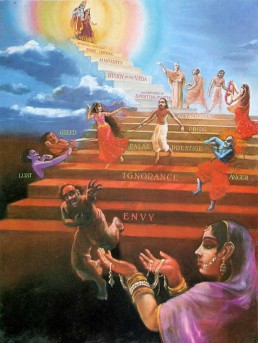Swami Chinmayananda
Swami Chinmayananda Commentary
The idea that God is Omniscient is common to all religions of the world, but a satisfactory explanation of this concept is given only in Vedanta. In the Geeta too — as a Bible of the Hindu religion, as a hand-book of easy reference for the students of the Upanishads — we find a wider hint as to what we mean by the Omniscience of the Self.
The Self, as the Pure Consciousness, is the illuminating principle that brings the entire field of the mind and intellect under the beam of Its clear awareness. Even the world-of-objects is brought within our understanding only when it enters, through the sense-organ-doors, and reaches the mental lake, and makes therein its characteristic thought-waves;
The thought-waves make the intellect function in classifying and determining them.
Both these mental and intellectual disturbances are illumined for us by the ever-wakeful Consciousness, the Self in us.
Sunlight illuminates all the objects of the world. When my eyes or ears illumine a given form or sound, I say that I see or hear that particular form or sound. In short, to be aware of a thing is to know that thing; and to know is to illumine. Just as the Sun can be considered as the “eye of the world,” inasmuch as without the Sun all organs-of-vision will be blind apertures, so too, the Self can be considered as the knower of everything, in everyone, at all times, and in all places. This Omniscience of the Supreme is vividly hinted at here, when Krishna declares, “I KNOW THE BEINGS OF THE PAST, OF THE PRESENT, AND OF THE FUTURE.”
It must be noted that the Eternal Self is not only the Awareness that lights up all bosoms at this present moment, but it was the awareness that illumined the objects, feelings and thoughts in all bosoms from the beginningless beginning of creation and it shall be the same Principle behind every knower that knows anything in all the future generations till the endless end of time!
Electricity revolves the fan; but the fan can never fan the electricity! The gazer surveys the heavens through a telescope, but the telescope can never survey the gazer! The Conscious Principle vitalises the food-made mind and intellect and makes them capable of feeling and thinking. Without the Self dynamising them, they are incapable of sense-perceptions; but neither the mind, nor the intellect, can perceive, feel, or comprehend the Subjective Principle, the Self. The Lord declares here that, though he knows everything, at all times, in all places, He is known by none at any place or at any time — “BUT ME NONE KNOWS.”
According to the strictest Vedantic philosophy, the Self is not a “knower,” just as in the strictest logic of thought it would not be correct to say that the Sun “illumines” the world. From our standpoint, contrasting with the hours of night when things are not illumined, we may rightly attribute the function of illuminating things during the day to the ‘principle of light’ called the Sun. However, from the standpoint of the Sun, which is ever brilliant, there is no moment when he is not blessing the objects with his shining touch. Therefore, it is as meaningless to say that the Sun “illumines” the objects, as to say that “I am too busy now-a-days breathing”!’
Knower-hood’ is a status gained by Self when It functions through the equipment of Maya; and the Self, that functions in and through delusory Maya, is called the God-principle, termed in the Vedantic literature as Ishwara. Here Krishna is pictured by Vyasa as the divine embodiment of Truth, and an Incarnation of the Self, and therefore, it is perfectly right if He arrogates to Himself the nature of Omniscience and declares Himself as “THE KNOWER OF EVERYTHING IN ALL THE THREE PERIODS OF TIME.”
But unfortunately, an ego-centric mortal viewing the universe through the pin-hole of his congested, constricted and limited mind-and-intellect, fails to see the harmonious rhythm in the macrocosm. He who can rip open his own self-made bondages of ignorance and rise to attune himself with the macrocosm, can certainly come to experience the Krishna view-point. Anyone who successfully comes to live thus in unison with the cosmic mind, is the Krishna of that age and for ever thereafter.
IF THE SELF IS THE ETERNAL KNOWER OF ALL CONDITIONED-KNOWLEDGE, THEN, WHAT VEILS THIS ESSENTIAL NATURE FROM OUR REALISATION? LISTEN:
Adi Sankara Commentary
O Arjuna, aham, I, however; veda, know; samatitani, the past beings; and vartamanani, the present. I know ca, also; bhavisyani, the future; bhutani, beings. Tu, but; na kascana, no one; veda, knows; mam, Me. Except the one person who is My devotee and has taken refuge in Me, no one adores Me, jus because he does not know My reality. ‘What, again,is the obstruction to knowing Your reality, being prevented by which the creatures that are born do not know You?’ In anticipation of such a question, the Lord says this:
The Bhagavad Gita with the commentary of Sri Sankaracharya – Translated by Alladi Mahadeva Sastry
Holy Geeta – Commentary by Swami Chinmayananda
The Bhagavad Gita by Eknath Easwaran – Best selling translation of the Bhagavad Gita
The Bhagavad Gita – Translation and Commentary by Swami Sivananda
Bhagavad Gita – Translation and Commentary by Bhaktivedanta Swami Prabupadha
Srimad Bhagavad Gita Chapter 7 – Verse 26 – 7.26 vedaham samatitani – All Bhagavad Gita (Geeta) Verses in Sanskrit, English, Transliteration, Word Meaning, Translation, Audio, Shankara Bhashya, Adi Sankaracharya Commentary and Links to Videos by Swami Chinmayananda and others – 7-26

